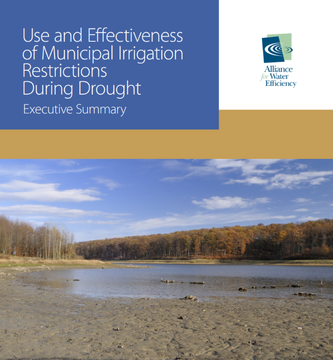New Research on Conservation During Drought
The Alliance for Water Efficiency has released a new research study on municipal drought response and water demand. The report, Use and Effectiveness of Municipal Irrigation Restrictions During Drought, explores how drought response measures have been implemented and how water demand reductions have been achieved across different water suppliers in different states.
 The report examines the following questions:
The report examines the following questions:
- What demand reductions can be achieved through different levels of mandatory and voluntary restrictions?
- How do messaging and enforcement programs influence effectiveness of restrictions?
- During times of drought, what can water suppliers do to maximize effectiveness of outdoor restrictions?
- What is the longevity of demand reductions after the end of a drought?
- What are the different forms of mandatory and voluntary irrigation restrictions typically implemented by North American water providers?
Key findings from the study include:
- Case study participants in California and Texas successfully reduced annual demand by 18-30% and peak monthly demand by 20-42% through a combination of mandatory demand management measures.
- Within this study, voluntary conservation did not generate statistically significant savings (i.e., estimated savings are indistinguishable from zero).
- Messaging and enforcement are viewed as best practices and essential components of a successful drought response.
- Water Shortage Contingency Plans should include all of these components: messaging, enforcement, irrigation day-of-week and/or time-of-day restrictions, drought surcharges, and implementation strategies.
- To be effective, Water Shortage Contingency Plans need codified rulemaking to include provisions that are enforceable on non-compliant customers.
The Executive Summary is available to the public. Download the Executive Summary here.
The full report can be accessed by going to https://www.allianceforwaterefficiency.org/
This two-year research study was conducted by Anil Bamezai, PhD of Western Policy Research along with Lisa Maddaus and her team at Maddaus Water Management, Inc. AWE sponsored this study with financial support from the participating water utilities. Peter Mayer of Water Demand Management developed the original research concept and served as AWE’s project manager for the study.



